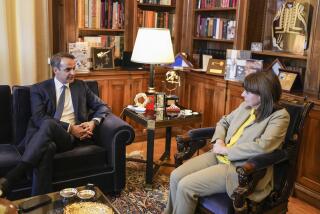Greek Premier Papandreou ekes out victory in confidence vote
- Share via
Reporting from Athens and London — Greek Prime Minister George Papandreou will keep his job, for the moment.
Papandreou squeaked through a confidence vote in Parliament early Saturday, but only by indicating he would step down if necessary to allow formation of a unity government that would carry out Europe’s latest plan to combat a raging debt crisis.
Papandreou’s narrow win, on a 153-145 vote, capped a roller-coaster week that saw him wreak international havoc by calling a referendum on that same bailout plan, a move he later retracted under heavy pressure at home and abroad.
Nervous European officials are adamant that the debt agreement they stitched together last week be implemented as soon as possible to prevent the crisis over the euro spreading from Greece, its epicenter, to the larger economies of Italy and Spain. Global investors are already watching those two countries warily and pushing up their borrowing costs to almost intolerable levels.
Papandreou’s victory in Parliament was something of a Pyrrhic one. To secure it, he was forced by his own Socialist party to agree that he would step aside if need be to pave the way for a government of national unity. The opposition New Democracy party has insisted that it will not participate in a bipartisan administration if Papandreou remains in power.
Once formed, the unity government’s main purpose would be to ratify and implement Europe’s new bailout deal, which includes a $180-billion rescue package for Greece — its second in 18 months.
Winning the confidence vote should allow the country to avoid a snap election, which Papandreou warned would be disastrous at such a pivotal moment, as Greece awaits a new installment of emergency loans to stave off default — a move that would have repercussions for the global economy. Papandreou’s intention is for a coalition government to guide the country through the next four months, after which an election would be held.
“The solution is for cross-party support for the new loan agreement now and, once normality has resumed, then go for elections,” Papandreou said during an impassioned speech in Parliament. “It’s time to work together with a sense of responsibility.... This is now a national priority.”
He was expected to meet Greece’s president Saturday to request formal permission to open talks for a coalition government.
Both the Socialist and New Democracy parties say they are committed to ratifying the complex bailout plan before Dec. 15, the date by which Athens needs its new batch of loans to avoid bankruptcy.
But that will not erase the sense of uncertainty and doom gripping the country.
Although many Greeks favor a cross-party government to steer their nation through its current storm, they do not like the bailout deal, which entails brutal austerity measures. On Friday night, as lawmakers debated the confidence motion, thousands of Communist demonstrators massed in the square across from the Parliament building in downtown Athens to speak out against the plan.
Any new government in Greece would still have to confront the growing political and social unrest that at times has tipped into violence.
Also, for the wider 17-nation Eurozone, the debt crisis will hardly be over. Key elements of the new bailout plan remain vague, especially how Europe expects to leverage the size of its $600-billion rescue fund to make it large enough to cover bigger nations like Italy.
But there was immediate relief across Europe after Papandreou scrapped his idea to hold a referendum on the deal, which ran a real risk of being shot down by voters.
The price of his abortive move has been steep: It has cost Papandreou, 59, much of his credibility with fellow world leaders and with his own people, including senior members of his party, and made it difficult for him to continue clinging to his post.
Ever defiant, he insisted that his maneuver had achieved his aim of galvanizing a consensus among lawmakers over the bailout deal.
Opposition leader Antonis Samaras poured scorn on that notion, saying the prime minister had succeeded only in sullying Greece’s reputation. He reiterated his demand that the prime minister resign to allow the president to appoint a technocratic caretaker government drawn from both sides of the house.
“The masks have fallen,” Samaras said. “Mr. Papandreou has rejected our proposal en bloc. The responsibilities he takes on now are enormous. The only solution is early elections.”
But Samaras’ colleague, Chrissanthos Lazaridis, confirmed that New Democracy would inform European leaders in writing of the party’s consent to the general terms of the new bailout plan.
As late as Thursday, when he announced that he was canceling plans for a plebiscite, Papandreou was resisting calls for his resignation from the opposition and from within his own ranks.
However, he appears to have relented somewhat after a number of lawmakers from his party warned that they would vote against him if he refused to agree to step down in the event that his continued presence proved an obstacle to the formation of a unity government.
Special correspondent Carassava reported from Athens and Times staff writer Chu from London.
More to Read
Sign up for Essential California
The most important California stories and recommendations in your inbox every morning.
You may occasionally receive promotional content from the Los Angeles Times.











